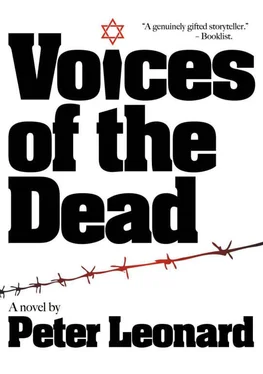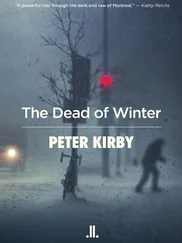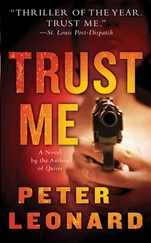“What could go wrong?”
“Maybe the man had a weapon and surprised you.” He saw Hess glance at him.
“How long would you have waited?”
“Until you were finished.”
“What if I did not come out?”
“But you did.”
“I am asking you this hypothetically.”
“I would have waited until it was no longer safe,” Rausch said, not exactly sure what he was saying, but Hess seemed to approve. He smiled. “Very good.”
“What did you talk about?”
“He owned an automobile dealership, sells Volkswagens. Can you believe that?”
Rausch went left on Rumfordstrasse.
“I told him I thought that was ironic, a Jew selling a car developed by the Führer.”
Rausch glanced at Hess. “What did he say?”
“Hitler had nothing to do with it. Ferdinand Porsche designed and built the Volkswagen.”
“Is that true?”
“I don’t know.”
“What was the woman’s occupation?”
“Retired. She had been a teacher at the Jewish Training Workshop on Biederstein in the late thirties.”
“What were the Jews training to be?”
“Swindlers,” Hess said, grinning. “What do you think?”
The streets were dark, deserted as they crossed Frauenstrasse, driving into Altstadt. He could see the tower of the Neues Rathaus.
“The Lachmanns were originally from Munich. They had emigrated to New York in 1939.” Hess looked at him. “Had I been a Jew that’s what I would have done. After Kristallnacht, anyone who did not know what was happening was either naïve or not paying attention.”
“Why did they come back?”
“Lachmann said because they are Germans. I told him they should have stayed in New York.”
“Did they resist, put up a fight?”
“Do they ever?”
That was what was so surprising. Jews went to their death like lambs to slaughter. If an intruder were trying to kill him Rausch would defend himself. “Were they afraid?”
“Someone woke you up and put a gun in your face, wouldn’t you be?”
“This isn’t happening,” Mrs. Lachmann had said. Hess grinned.
Rausch swung around to Kaufingerstrasse and pulled up behind Hess’ Mercedes parked on the street. He would leave the stolen VW in a parking garage.
Hess turned in the seat, ears still ringing from the gunshots. He pictured the Lachmanns kneeling naked on the cold hard concrete floor, Hess sitting in a chair behind them. They were always embarrassed taking their clothes off in front of a stranger. It made them feel vulnerable.
He had taken Herr Lachmann’s glasses and his wife’s engagement ring to add to his collection. He would relive the encounter later. Now he was more interested in hearing about Harry Levin. The Jew surprising him, first coming to the restaurant in Washington DC, sitting at the table with them, speaking German with his Bavarian accent, fooling all of them. Hess thought that one incident would be the end of it. The man would go home and he would never think about him again. At the urging of the ambassador, he had even agreed to pay for the daughter’s funeral expenses, trying to put a positive spin on what had happened. The Washington Post acknowledged his sympathetic gesture in a brief article, and quoted him saying: “My heartfelt apology goes out to Mr. Levin and his family.” The carefully worded press release had been written by a publicist at the embassy. It mentioned Hess’ involvement but never admitted culpability or guilt.
Two weeks later the crazy kike sneaks onto his estate. Hess couldn’t believe it, looking across the tennis court, seeing a man standing on the other side of the fence with a gun, thinking he was going to shoot him, this lunatic from Detroit who sold scrap metal. And although the surveillance photographs were inconclusive Hess was positive it was Levin. Who else? Levin was seen again outside the fence at the airship factory, and Hess knew he had to do something. This Jew wasn’t going away.
Rausch had followed Levin to the ratskeller, despatching six men to take care of him, put him in the hospital, but not kill him. With Munich hosting the Olympic Games in eleven months, Hess didn’t want the negative publicity of a murdered American tourist, an incident that might imply Munich was not safe.
Harry Levin had escaped again and no one had been able to give him a reasonable explanation as to why. “Tell me how he got away,” Hess said to Rausch.
“He was lucky.”
“Lucky,” Hess said. “There were six of them.”
“A Negro was helping him,” Rausch said. “He was skilled.”
“A Negro? They were together?” Hess said. This was getting interesting. “Who is he?”
“An American soldier. They were sitting next to each other at the bar. My men chased them down the street,” Rausch said. “They were about to pull them out the car when the police arrived.”
More excuses.
Hess got behind the wheel of the Mercedes and drove to the apartment.
Earlier that morning Rausch had stood tall and erect in front of his desk, military bearing still evident three decades after Germany had lost its army and Rausch his rank. He was a born soldier. Needed to be told what to do, and needed to be complimented after completing a job. They had been together since ’43, assigned to Einsatzgruppen B.
As big and strong as Rausch was, he had been bothered by killing Jews. Rausch would feel sick, couldn’t eat or sleep. Hess had joked about it. “What is your problem? My appetite has never been better. I sleep like a baby.”
They were in Poland in 1945 when the Russians were coming from the east and the Americans from the west and it was a foregone conclusion Germany had lost the war. Hess and Rausch walked away from their battalion one night, stole a military vehicle and drove to Lodz.
Hess had money, diamonds and gold he had taken from the Jews, acquiring a small fortune. He had purchased clothing and an automobile so they could make their way back to Germany. After the war Hess started a construction company to repair Germany’s war-torn cities, and had become rich. He had traveled extensively between Munich, Frankfurt and Dresden, often carrying large sums of money, and decided he needed a gun for protection.
Rausch had said, “Do you remember the first one?”
“Do you mean after the war?”
“Yes. I was trying to think of the year.”
“1947,” Hess said. “I was still following orders.”
“Come on. I watched you. You enjoyed it.”
“Is it wrong to enjoy your work?” Hess said.
“I don’t think it had anything to do with work or taking orders,” Rausch said. “The Reich was over. You did this on your own. For yourself. Maybe you couldn’t stop.”
It was true, of course, although he had never admitted it to anyone, surprised Rausch had been so observant. “We were rebuilding parts of Dresden, do you remember? The city had virtually been destroyed. We used to eat at a certain cafe, and I couldn’t help but notice Jews were returning to the city. There was one couple we saw regularly.”
“The Jewess you couldn’t take your eyes off of,” Rausch said.
“You do remember. One day she dined alone and left her gloves on the table. I picked them up and followed her home. She lived in a flat in an old building that had been hit by Allied bombs. Parts of it had been destroyed.”
“Were you thinking about killing her?”
“No, I was thinking about returning the gloves,” Hess said. “My good deed for the day.”
“Is this the truth?”
“Do you want me to tell you?”
Rausch sat back.
“Her flat was on the first floor.”
“Was she married?”
“I am getting to that.” Hess gave him a hard look. “I rang the bell and heard a dog barking. The woman, her name was Gail Kaplan, opened it a crack and I held up her gloves. She swung it open and a little dog, a dachshund, tried to get out. She said, ‘No‚ Karl.’ The dog barked, I squatted and pet it. ‘What a beautiful dog,’ I said. ‘I‚ too‚ have a dachshund.’”
Читать дальше












